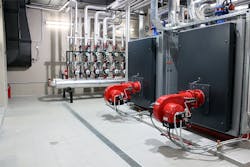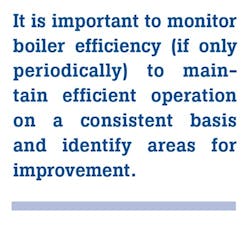Application Corner: Boiler efficiency improvements pay off
Boiler efficiency is a big deal because large industrial and utility boilers can consume in excess of US$100 million per year of fuel. Therefore, improving boiler efficiency by only 1 percent can represent fuel savings of approximately US$1 million per year while also being more environmentally benign (greener). Similar fuel savings in smaller boilers will likewise produce significant energy savings relative to their fuel costs. Therefore, it is important to monitor boiler efficiency (if only periodically) to maintain efficient operation on a consistent basis and identify areas for improvement.
Determining the combustion efficiency of a boiler would seem to be a straightforward task that can be performed by looking up the efficiency in a table for a given fuel based on the excess oxygen in the stack and the stack temperature rise above ambient conditions. It should be noted that this technique to determine boiler combustion efficiency does not require any flow measurements.
This approach can work well when the applicable temperature and oxygen measurements are available (even if only on a temporary basis) and the boiler uses a single fuel such as natural gas or a specific grade of fuel oil. In practice, this approach is applicable to a large number of relatively small boilers that are used for generating steam in small industrial plants and in building/facility heating systems. In addition, tables are available or can be generated for other consistent fuels such as coal and wood with stable levels of moisture.
David W. Spitzer is a regular contributor to Flow Control magazine and a principal in Spitzer and Boyes LLC, which offers engineering, seminars, strategic, marketing consulting, distribution consulting and expert witness services for manufacturing and automation companies. Spitzer and Boyes is also the publisher of the Industrial Automation INSIDER. He has more than 40 years of experience and has written more than 10 books and 350 articles about flow measurement, instrumentation and process control.
Spitzer may be reached at 845-623- 1830 or via spitzerandboyes.com. Click on the "Products" tab to find his Consumer Guides to various flow and level measurement technologies.
About the Author
David W. Spitzer
David W Spitzer’s new book Global Climate Change: A Clear Explanation and Pathway to Mitigation (Amazon.com) adds to his over 500 technical articles and 10 books on flow measurement, instrumentation, process control and variable speed drives. David offers consulting services and keynote speeches, writes/edits white papers, presents seminars, and provides expert witness services at Spitzer and Boyes LLC (spitzerandboyes.com or +1.845.623.1830).


